Gardening acts as a natural remedy for anxiety by immersing you in nature and engaging your senses. You'll focus on the present moment, reducing anxious thoughts as you tend to plants. The physical activity releases mood-boosting endorphins, while the sense of accomplishment nurtures self-esteem. Touching soil, smelling flowers, and hearing birds create a calming sensory experience. You can also connect with others through community gardens, reducing feelings of isolation. Caring for living things provides a sense of purpose, and the routine of gardening offers structure and predictability. Exploring this therapeutic practice can reveal even more benefits for your mental well-being.
Key Takeaways
- Gardening fosters a deep connection with nature, reducing stress and cortisol levels.
- Mindful engagement in gardening tasks promotes focus and interrupts anxious thoughts.
- Physical activity involved in gardening releases mood-boosting endorphins and improves overall health.
- Nurturing plants provides a sense of accomplishment and boosts self-esteem.
- Gardening offers sensory experiences that ground individuals and alleviate anxiety.
Connection With Nature
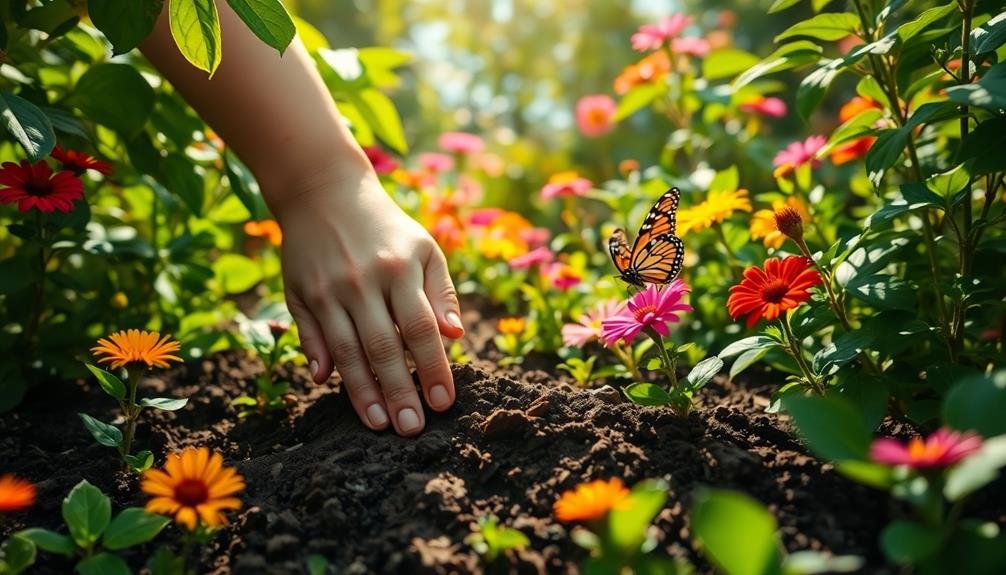
Many people find that spending time in nature can considerably reduce stress and anxiety. Gardening offers a unique opportunity to connect with the natural world right in your own backyard. As you dig your hands into the soil, you're not just planting seeds; you're grounding yourself in the earth's rhythms.
This connection with nature triggers a cascade of positive effects on your mental health. You'll notice a decrease in cortisol levels, the stress hormone, as you immerse yourself in the greenery. The sights, sounds, and smells of your garden engage your senses, drawing your attention away from anxious thoughts and into the present moment.
You're also participating in the cycle of life as you nurture plants from seed to bloom. This process can foster a sense of purpose and accomplishment, boosting your mood and self-esteem. The act of tending to living things outside yourself can shift your focus from internal worries to external care, providing a natural antidote to anxiety.
Mindful Focus on Present Moment
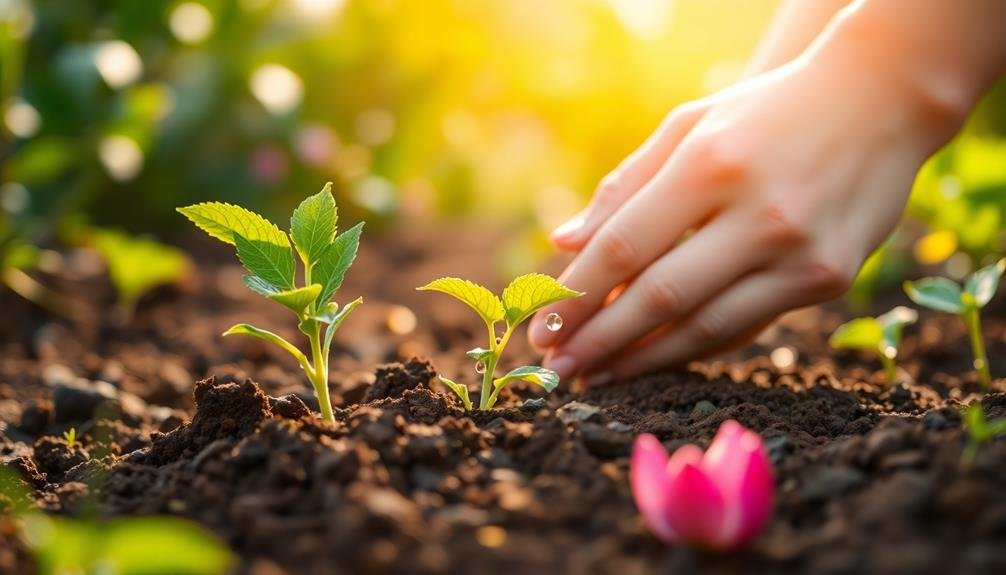
When you're gardening, you're naturally drawn into the present moment through sensory experiences.
You'll feel the soil between your fingers, smell the fragrant flowers, and hear the rustling of leaves in the breeze.
This grounding effect, coupled with your focus on immediate tasks like planting or weeding, can help quiet anxious thoughts and promote a sense of calm.
Grounding Through Sensory Experiences
As you immerse yourself in gardening, the practice naturally encourages grounding through sensory experiences. Your hands sink into cool, damp soil, connecting you with the earth beneath. The vibrant colors of flowers and foliage stimulate your visual senses, while the fragrance of herbs and blossoms fill the air around you.
You'll hear the rustling of leaves in the breeze and the gentle buzzing of bees as they pollinate nearby plants. The taste of a freshly picked tomato or herb can awaken your palate, reminding you of nature's bounty. These sensory inputs help anchor you in the present moment, drawing your attention away from anxious thoughts.
The textures you encounter – smooth petals, rough bark, and delicate leaves – engage your sense of touch, further rooting you in the physical world. As you work, you'll feel the warmth of the sun on your skin and the invigorating mist of water as you tend to your plants.
This multi-sensory experience creates a powerful grounding effect, helping to alleviate anxiety and promote a sense of calm and connection to your environment.
Attention on Immediate Tasks
Gardening demands your full attention, drawing you into the present moment. As you work in your garden, you're forced to focus on the task at hand, whether it's planting seeds, pruning branches, or pulling weeds. This mindful focus can help quiet anxious thoughts and worries about the future, allowing you to experience a sense of calm and groundedness.
When you're engrossed in gardening activities, you're practicing a form of mindfulness meditation without even realizing it. You're fully engaged with your immediate environment, using your senses to guide your actions.
This intense focus on the present can help reduce stress and anxiety by:
- Interrupting rumination and negative thought patterns
- Increasing your awareness of your surroundings
- Promoting a sense of accomplishment and purpose
- Encouraging a state of flow, where time seems to stand still
Physical Activity and Exercise

Gardening provides a natural form of physical activity that can boost your mood through endorphin release.
As you dig, plant, and weed, you'll engage in low-impact exercise that reduces stress and anxiety.
Endorphin Release Through Movement
The physical activity involved in gardening offers a natural way to boost your mood and reduce anxiety. As you dig, plant, weed, and water, your body engages in various movements that stimulate the release of endorphins. These natural "feel-good" chemicals in your brain help alleviate stress and promote a sense of well-being.
When you're gardening, you're likely to experience:
- Increased heart rate from activities like raking or pushing a wheelbarrow
- Improved flexibility from bending and stretching to tend to plants
- Enhanced strength from lifting bags of soil or carrying watering cans
- Better coordination as you perform precise tasks like pruning or seed sowing
The repetitive nature of many gardening tasks can also induce a meditative state, further contributing to anxiety reduction. As you focus on the physical aspects of gardening, your mind gets a break from worrying thoughts.
This combination of movement and mindfulness creates a powerful antidote to anxiety.
You don't need to engage in intense gardening sessions to reap the benefits. Even light gardening activities can trigger endorphin release, helping you feel more relaxed and content.
Regular gardening can lead to cumulative effects, potentially reducing anxiety levels over time.
Stress-Reducing Outdoor Exercise
When you step outside to tend your garden, you're not just nurturing plants—you're engaging in a form of outdoor exercise that can greatly reduce stress. Gardening involves a variety of physical activities, from digging and planting to weeding and pruning, all of which contribute to your overall fitness and well-being.
As you work in your garden, you'll find yourself naturally moving your body in ways that improve flexibility, strength, and endurance. The repetitive motions of raking, hoeing, and watering can be surprisingly effective in burning calories and toning muscles.
Unlike the structured environment of a gym, gardening allows you to exercise at your own pace in a natural setting.
The outdoor aspect of gardening adds another layer of stress reduction. Exposure to fresh air and sunlight helps boost your mood and vitamin D levels.
The natural surroundings provide a calming effect, allowing you to disconnect from daily stressors and focus on the present moment. This combination of physical activity and connection with nature makes gardening an ideal form of stress-reducing outdoor exercise that can greatly improve your mental and physical health.
Sense of Accomplishment
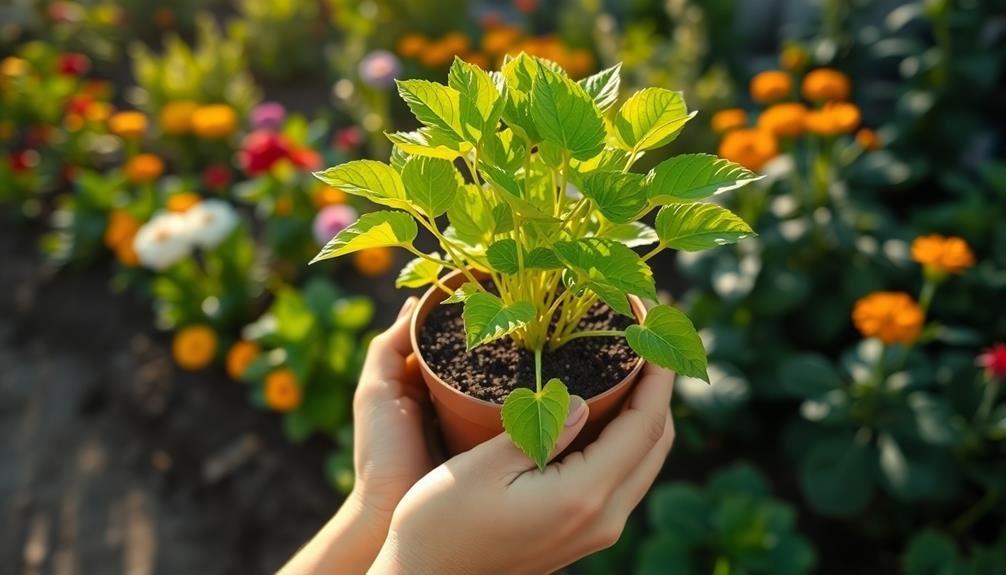
Nurturing plants from seeds to full-grown specimens offers a profound sense of accomplishment. As you watch your garden evolve, you'll experience a boost in self-esteem and confidence. This feeling of achievement can greatly reduce anxiety by shifting your focus to positive outcomes and personal growth.
Gardening provides tangible results that you can see, touch, and even taste. Whether you're growing vibrant flowers or nutritious vegetables, each successful harvest reinforces your ability to create and sustain life. This sense of accomplishment extends beyond the garden, influencing other areas of your life and helping you tackle challenges with renewed vigor.
The satisfaction derived from gardening can manifest in various ways:
- Witnessing the daily progress of your plants
- Successfully troubleshooting garden problems
- Sharing your homegrown produce with friends and family
- Creating a beautiful outdoor space that reflects your efforts
Stress-Reducing Sensory Experiences

Sensory immersion in the garden provides a powerful antidote to anxiety. As you engage with your garden, you'll experience a variety of stress-reducing sensory stimuli that can help calm your mind and body.
The visual beauty of colorful flowers, lush foliage, and vibrant produce can instantly uplift your mood and distract you from worrisome thoughts. You'll find yourself captivated by the intricate patterns of leaves and petals, focusing your attention on the present moment.
The tactile sensations of gardening are equally soothing. You'll feel the cool, damp soil between your fingers, the smooth surfaces of seeds, and the varying textures of plant leaves. These physical connections to nature can ground you and provide a sense of stability.
The garden's aromatic qualities also play a significant role in reducing stress. You'll inhale the fresh scent of newly turned earth, the fragrance of blooming flowers, and the invigorating aroma of herbs. These natural scents can trigger positive emotions and memories, helping to alleviate anxiety.
Lastly, the sounds of nature in your garden—birdsong, rustling leaves, and buzzing insects—create a peaceful auditory environment that promotes relaxation and mindfulness.
Social Interaction Opportunities
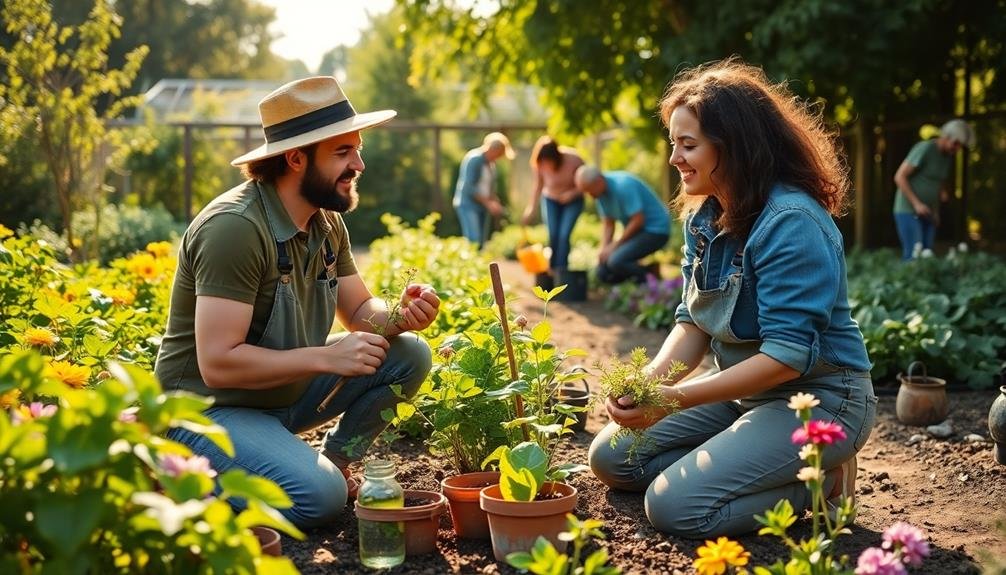
Gardening isn't just a solitary pursuit; it's also a gateway to meaningful social connections. As you tend to your plants, you'll find opportunities to interact with neighbors, join gardening clubs, or participate in community garden projects.
These social interactions can greatly reduce feelings of isolation and loneliness, which often contribute to anxiety.
You'll discover that gardening creates a common ground for conversations and shared experiences. Whether you're swapping tips, exchanging seeds, or discussing the latest pest control methods, you're building relationships with like-minded individuals.
These connections can provide emotional support and a sense of belonging, both essential for managing anxiety.
Here are some ways gardening can enhance your social life:
- Join a local gardening club or online forum
- Participate in community garden projects
- Attend gardening workshops or classes
- Host garden parties or plant swaps with friends and neighbors
Nurturing Living Things

Tending to living plants provides a profound sense of purpose and connection to nature. As you care for your garden, you're nurturing life and watching it grow, which can be incredibly rewarding and calming. This process of nurturing helps shift your focus away from anxious thoughts and onto the present moment.
You'll find yourself developing a routine of watering, pruning, and fertilizing your plants. This consistent care creates a sense of responsibility and accomplishment as you see the tangible results of your efforts. The act of nurturing living things can also boost your self-esteem and confidence.
Observing the growth cycle of plants teaches patience and acceptance. You'll learn to embrace the natural rhythm of life, understanding that growth takes time and setbacks are part of the process. This perspective can help you approach your own challenges with a more balanced mindset.
Moreover, the act of nurturing plants can trigger the release of oxytocin, often called the "love hormone." This chemical promotes feelings of bonding and well-being, further reducing anxiety and stress.
Routine and Structure

Creating a consistent gardening routine provides structure to your day and can greatly reduce anxiety. When you establish a regular schedule for tending to your plants, you're giving yourself a sense of purpose and predictability. This routine can act as an anchor, especially during times of stress or uncertainty.
By incorporating gardening into your daily or weekly routine, you're creating a reliable constant in your life. You'll find comfort in knowing what to expect and when to expect it. This structure can help calm racing thoughts and provide a sense of control over your environment.
Here are some ways gardening routines can benefit your mental health:
- They offer a peaceful start or end to your day
- They provide a sense of accomplishment and progress
- They create a regular opportunity for mindfulness and reflection
- They establish a connection to nature's rhythms and cycles
As you develop your gardening routine, you'll likely find that it becomes a welcome respite from the chaos of daily life. The predictability of caring for your plants can offer a soothing counterbalance to the unpredictability of other aspects of your life, helping to reduce overall anxiety levels.
Frequently Asked Questions
Can Gardening Help With Specific Types of Anxiety Disorders?
Yes, gardening can help with various anxiety disorders. You'll find it beneficial for generalized anxiety, social anxiety, and PTSD. It's a grounding activity that promotes mindfulness, reduces stress, and boosts your mood through physical exercise and nature connection.
How Long Does One Need to Garden to See Anxiety-Reducing Benefits?
You'll often notice anxiety-reducing benefits after just 30 minutes of gardening. However, regular practice over several weeks can lead to more significant and lasting effects. Consistency is key, so try to garden a few times a week.
Are Indoor Plants as Effective for Reducing Anxiety as Outdoor Gardening?
While indoor plants can help reduce anxiety, they're not as effective as outdoor gardening. You'll still benefit from caring for houseplants, but outdoor gardening offers additional perks like sunlight exposure, physical activity, and a stronger connection to nature.
What Are the Best Plants for Beginners to Grow for Anxiety Relief?
You'll find lavender, chamomile, and jasmine great for anxiety relief. They're easy to grow and smell fantastic. Aloe vera and snake plants are low-maintenance options that purify air. Start with these, and you'll soon feel more relaxed.
Can Gardening Be Combined With Other Anxiety Treatments for Enhanced Effects?
Yes, you can combine gardening with other anxiety treatments for better results. Try pairing it with meditation, deep breathing exercises, or therapy. You'll find that gardening complements these practices, enhancing your overall anxiety management and mental well-being.
In Summary
You've discovered the healing power of gardening for anxiety. By connecting with nature, focusing on the present, and engaging in physical activity, you're cultivating peace of mind. Your garden provides a sense of achievement, sensory delights, and opportunities for social interaction. As you nurture plants, you're nurturing yourself. Embrace the routine and structure gardening offers. It's more than a hobby; it's a natural remedy that can help you blossom alongside your plants.


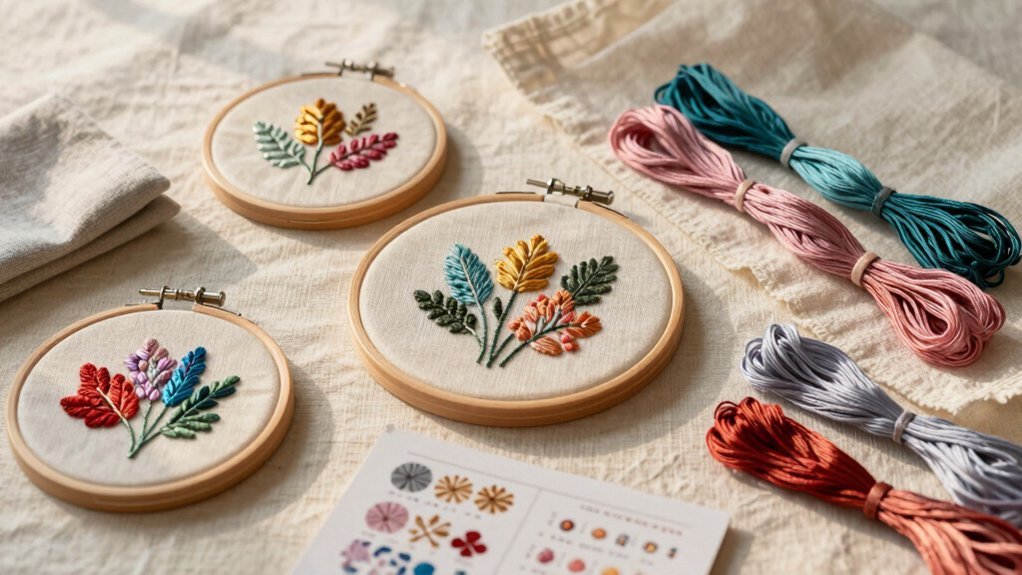


Leave a Reply